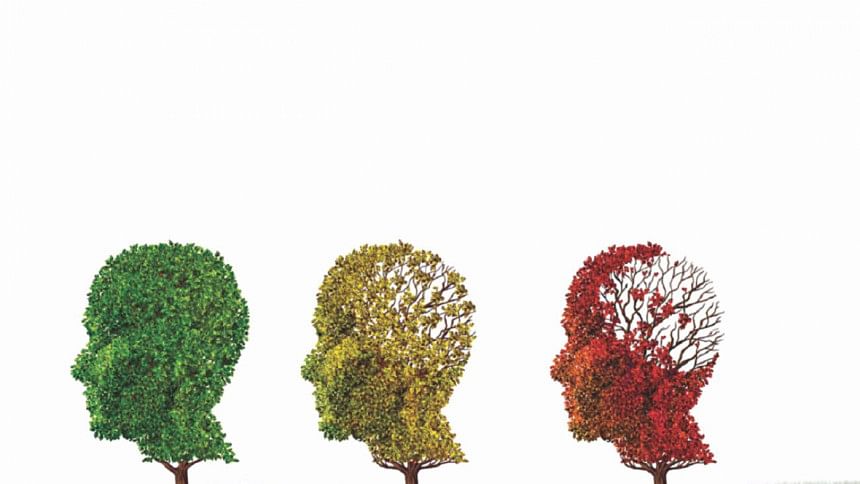Understanding dementia

Dementia is one of the newest medical terms added to the parlance as the number of people suffering from the ailment are ever increasing. Although well-aware of the term, people are unfamiliar as to what it means, how it affects the patients, and how the disease often devastatingly touches the lives of everyone around the patient suffering from it.
My mother struggled for over one-and-a-half decade with the condition. After the initial diagnosis, being a physician myself, I undertook some additional research and tried to understand the problem better, and help educate my family as to how we should deal with the matter.
Yet, even with the professional knowledge I had, it was difficult for me, and it was hard for everyone else to cope with the trauma of dealing with someone having dementia.
My mother's condition had the usual typical symptoms — she forgot where she had left the keys, or kept the surplus cash for safekeeping. She was in-charge of such household matters all her life and as the symptoms grew serious, medical attention was sought. She was diagnosed with having dementia with Alzheimer's disease.
Things went rock bottom when one day, completely out of the blue, I received a call from my sister, and in a distressing tone she said that mother had taken her bath, and for the longest time stood in front of the mirror with the sari in her hand, before finally reaching to my sister for help wearing it. She had forgotten how to wear a sari!
As days passed by, her condition deteriorated. She became inactive by the passing day, gradually forgot how to cook our favourite meals, how to read and write, to recite sacred verses and perform namaz. At one point, she forgot out names and even failed to recognise the people closest to her.
I cannot express the sadness felt by children whose parent fail to recognise them; not call them by their pet name, and looks at them as if they are total strangers. But that is exactly what happens at some stage of the disease.
At the beginning I used to long for those familiar sounds, and words but later learned to accept reality. She spent the last 15 years of her live suffering from dementia. During this time, we tried our best to keep her around familiar surroundings. We took her to all social gatherings and even her sister's funeral.
My mother forgot and needed to be reminded over and again that her sister was no more; and as horrid as it was — she was going through the trauma of losing a sibling in a cycle. At one point we stopped correcting her delusions and just let her be.
I believe, not only as a physician but also as someone who has seen the debilitating effects of the disease first hand, it is important for family members, especially all caregivers, to be aware of the degenerating pattern of the disease —not only the medical aspect, but also the psychological effect it has on the patient and family.
It is very important to keep patients suffering from the disease in their familiar environment, the same routine and habitual setting. The family members themselves must accept the changes, not matter how traumatic the experience can be.
My parents had travelled the world together and it was very difficult for him to come in terms with the harsh, reality. At one point, my father became her primary caregiver, along with my younger sister and a very devoted helper.
As her condition worsened, she lost her speech and for the last two years before her death, lost her ability to communicate. She forgot how walk, to use the toilet and had to be fed. And after about 15 years of her suffering, she succumbed to the inevitable.
May her soul rest in eternal peace.
A NOTE ON THE CLINICAL ASPECTS
The causes of dementia are varied and depend on which side of the brain is affected. If the cerebral cortex or outer part of the brain is affected, like in Alzheimer's disease, Creutzfeldt–Jakob disease, etc. the memory and language areas are affected. The patient slowly loses the ability to remember familiar day to day words, names of acquaintances, their own children.
They start to forget recent events like what they had for breakfast, or even if they had breakfast, special occasions like birthdays and other important events.
In subcortical dementia the deeper part of the brain is affected and functions like speed of thinking and ability to initiate movement is affected. Patients faced with this from of dementia do not become forgetful or face problems expressing themselves, but their thinking process becomes slower. Parkinson's disease, Huntington's disease, etc. falls in this category.
Being a degenerative disorder, dementia in almost all cases is not curable. Medication only helps to slow down the degenerative process and control the disease. Early diagnosis, maintaining healthy blood-sugar levels, controlling hypertension, etc. are important in the treatment.
The patient needs to be kept as active as possible, in a familiar routine and a loving environment. As more and more families are becoming nuclear, the younger generation are gradually living away from parents for various reasons.
On a social level, we need to start thinking about building facilities where patients who do not have anyone to support them, can receive care and treatment. These facilities should have expert consultants as well as trained, compassionate caregivers.
Photo: Collected

 For all latest news, follow The Daily Star's Google News channel.
For all latest news, follow The Daily Star's Google News channel. 



Comments